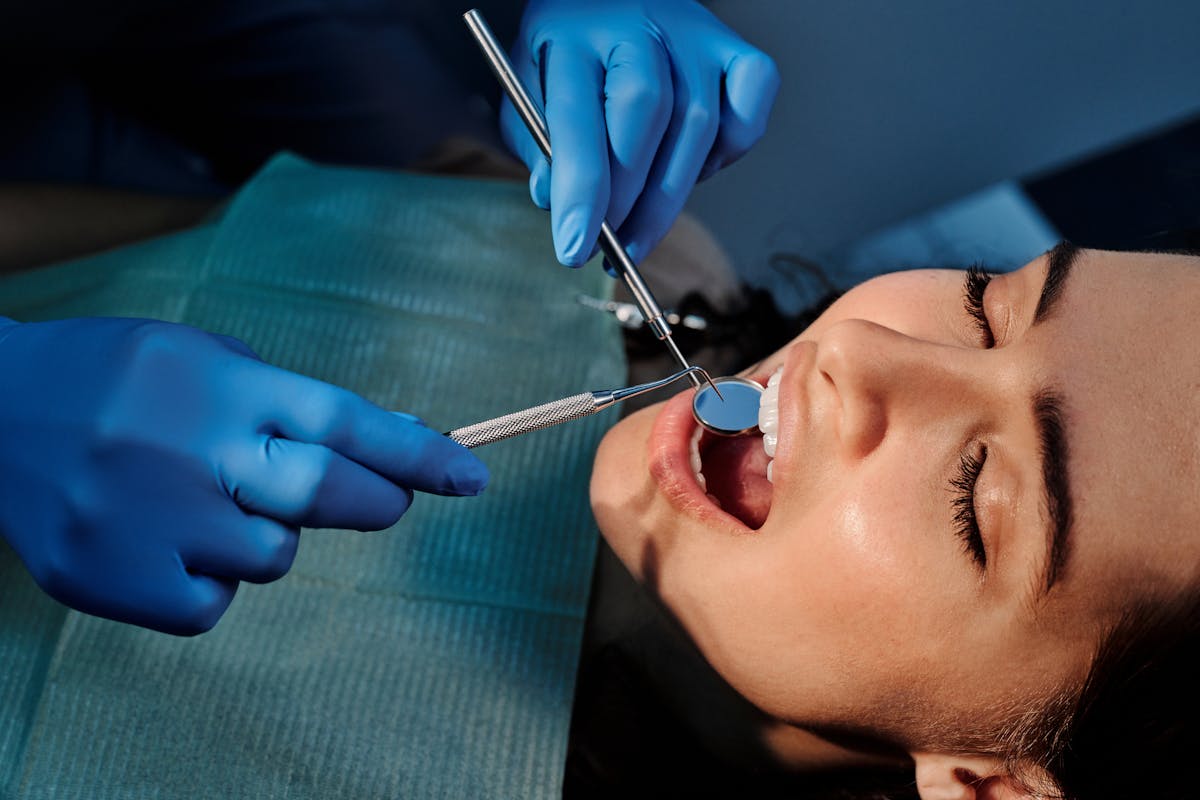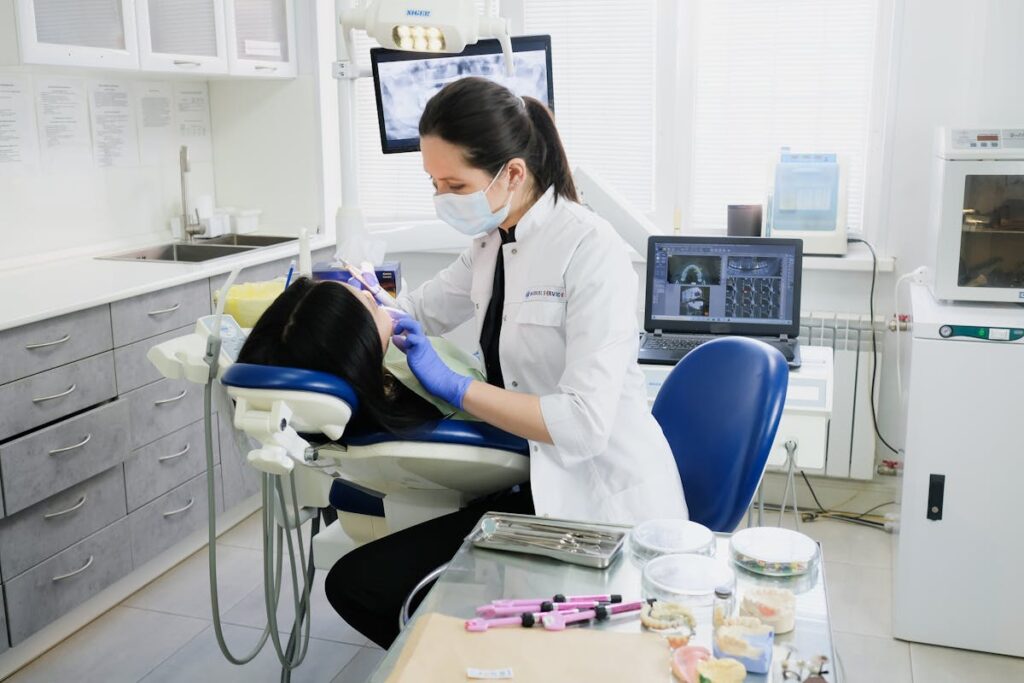Professional dental cleanings are essential in maintaining children’s oral health. Starting by age one or within six months of the first tooth’s emergence, these cleanings should occur every six months. This schedule aids in plaque removal and the early detection of dental issues while encouraging positive dental experiences. Factors like dental anxiety and existing oral health conditions may alter this frequency. Understanding how these variables affect your child’s needs could be critical in ensuring ideal dental care.
Importance of Dental Cleanings for Children
Ensuring regular dental cleanings for children is essential, as it lays the groundwork for their long-term oral health. Early introduction to professional cleanings can greatly reduce dental anxiety, fostering a positive attitude toward oral hygiene practices. Research highlights that preventive care, including professional cleanings, diminishes the risk of cavities and gum disease by removing plaque and tartar that daily brushing might miss. Cleanings also allow dental professionals to identify potential issues early, ensuring timely intervention. By familiarizing children with dental environments from a young age, caregivers help prevent the development of fear associated with dental visits. This proactive approach benefits not only the child’s oral health but also contributes to their overall well-being, reducing future dental care costs and complications.
Age-Based Recommendations for Dental Cleanings
Experts recommend that toddlers receive their first dental cleaning by age one, as early visits help establish a foundation for lifelong oral health. For school-age children, regular dental cleanings every six months are advised to prevent cavities and monitor dental development. These guidelines are based on evidence showing that early and consistent dental care greatly reduces the risk of dental issues in children.
Dental Cleanings for Toddlers
When it comes to dental cleanings for toddlers, initiating a routine early in a child’s life is essential for establishing lifelong oral health habits. Experts recommend scheduling the first dental visit by the time a child reaches their first birthday or within six months after the first tooth emerges. This early visit is vital for monitoring toddler oral hygiene and familiarizing the child with the dental environment. During these visits, dental professionals can provide guidance on proper brushing techniques and dietary recommendations to prevent cavities. Regular visits for pediatric dental cleaning are advised every six months, aligning with general pediatric dental guidelines. This biannual schedule not only aids in plaque removal but also enables early detection of potential oral health issues, ensuring toddlers maintain healthy, strong teeth.
Cleanings for School-Age Children
As toddlers grow into school-age children, their dental care needs evolve, necessitating specific age-based recommendations for maintaining excellent oral health. Regular professional cleanings every six months are advised to guarantee the best school age hygiene. This frequency helps prevent cavities and gum disease, common issues in this age group. During these visits, dental professionals also provide dental education tailored to children, emphasizing the importance of brushing twice daily with fluoride toothpaste and flossing. Parents are encouraged to supervise and assist to reinforce these habits. Additionally, dental check-ups allow for early identification of potential orthodontic issues, enabling timely intervention. Evidence indicates that instilling these practices enhances long-term oral health and fosters responsible dental care behaviors as children mature.
Factors Influencing Cleaning Frequency
Although establishing a routine for children’s dental cleanings is essential, the frequency of these visits can be influenced by a variety of factors. One primary consideration is cleaning costs, as financial constraints may affect a family’s ability to adhere to the recommended biannual schedule. Additionally, child anxiety associated with dental visits can also play a significant role. Children who experience high levels of dental anxiety may require adjustments in the frequency of cleanings to guarantee a positive experience and reduce stress. Moreover, a child’s oral health status, including the presence of cavities or gum disease, may necessitate more frequent cleanings to manage and prevent further issues. Dental professionals often tailor cleaning schedules to address these individual needs, guaranteeing ideal oral health.
Role of Diet in Dental Health
Understanding the role of diet in dental health is essential to maintaining effective oral hygiene in children. Excessive sugar intake greatly contributes to tooth decay, as bacteria in the mouth metabolize sugars, producing acids that erode enamel. Similarly, acidic foods weaken the enamel, creating an environment favorable for cavities. Limiting these dietary components is vital. Meanwhile, adequate hydration is important; water helps wash away food particles and dilute acids in the mouth, protecting dental health. Foods high in fiber, such as fruits and vegetables, stimulate saliva production, which naturally cleans teeth and neutralizes harmful acids. As a result, fostering a balanced diet with limited sugars and acids, while emphasizing hydration and fiber-rich foods, plays a pivotal role in promoting children’s dental wellness.
Signs Your Child May Need More Frequent Cleanings
When should parents consider more frequent dental cleanings for their children? Pediatric dental experts suggest monitoring for certain indicators that may necessitate additional visits. One critical sign is the child’s dental discomfort, which can manifest through complaints of pain or sensitivity. This discomfort may affect their willingness to eat, leading to noticeable changes in appetite. A decreased interest in food or an aversion to specific textures can indicate underlying dental issues requiring attention. Additionally, consistent bad breath or visible plaque buildup are signs that existing oral hygiene practices may be insufficient. Regular observation of the child’s oral health habits and any related behavioral changes can guide parents in determining whether more frequent professional cleanings are necessary to maintain ideal dental health.
Benefits of Regular Professional Cleanings
Regular professional dental cleanings offer numerous benefits that are essential for maintaining a child’s oral health. These cleanings serve as a critical component of preventive care, targeting plaque and tartar buildup that routine brushing may miss. By doing so, they greatly reduce the risk of cavities and gum disease. Expert dental hygienists provide thorough oral hygiene assessments, ensuring early detection of potential issues, such as misalignment or decay, which can be addressed promptly. Professional cleanings also reinforce good oral hygiene practices, educating children on proper brushing and flossing techniques. Additionally, these regular visits can foster a positive attitude toward dental care, reducing anxiety and promoting lifelong habits of oral health maintenance. Consequently, consistent professional cleanings are key to sustaining a child’s healthy smile.

How to Prepare Your Child for a Dental Visit
How can parents effectively prepare their child for a dental visit? Successful dental visit preparation involves reducing child anxiety through familiarization and positive reinforcement. Parents should begin by explaining the process in simple terms, using age-appropriate language. Reading children’s books about dental visits can demystify the experience and build familiarity. Role-playing a dental check-up at home can further alleviate fears.
Evidence suggests that scheduling appointments at times when the child is well-rested and fed can improve cooperation. Parents are encouraged to maintain a positive attitude, avoiding negative words that may induce fear, such as “pain” or “hurt.” Employing relaxation techniques, like deep breathing, can aid in child anxiety management. Finally, offering a small reward post-visit can reinforce a positive experience.
Tips for Maintaining Oral Health Between Visits
Guaranteeing children maintain good oral health between dental visits requires consistent and effective practices. Developing proper brushing habits is essential; children should brush their teeth twice daily for two minutes using fluoride toothpaste. It’s recommended that caregivers supervise brushing to guarantee thorough coverage of all tooth surfaces. Appropriate flossing techniques must also be introduced as soon as children have two teeth that touch. Flossing should be performed once daily to remove plaque and food particles from between teeth, where brushes cannot reach. Encouraging a balanced diet low in sugary snacks and drinks further supports oral hygiene. Additionally, regular use of mouthguards during sports can prevent dental injuries. These strategies collectively aid in preventing cavities and maintaining dental health between professional cleanings.
Consulting Your Pediatric Dentist for Personalized Advice
Pediatric dentists play an essential role in developing a tailored dental care plan that addresses the unique needs of each child. Evidence suggests that the frequency of dental visits should be based on individual oral health conditions, which these specialists can accurately assess. Consulting a pediatric dentist guarantees that a child’s dental care is both effective and appropriate, promoting ideal oral health outcomes.
Tailored Dental Care Plan
While every child’s dental needs are unique, consulting a pediatric dentist guarantees a tailored dental care plan that addresses specific oral health requirements. Pediatric dentists conduct personalized assessments, considering factors such as dental history, current oral condition, and developmental milestones. These experts utilize evidence-based practices to evaluate each child’s risk for cavities, gum disease, and other dental issues. By reviewing a child’s dental history, they can identify patterns or recurring problems that may require special attention. This approach makes certain that preventive measures are strategically implemented, fostering ideal oral health. Tailored plans may include recommendations for professional cleanings, guidance on home care routines, and advice on dietary choices. Such personalized care is essential in promoting lifelong dental health from an early age.
Frequency Based on Needs
Determining the ideal frequency for children’s dental cleanings hinges on a personalized assessment of their oral health needs. Pediatric dentists play an essential role in evaluating these needs, taking into account factors such as dental anxiety and specific cleaning techniques that may be required. Some children may need more frequent visits due to higher risk factors like cavities or gum disease, while others with excellent oral hygiene may manage with biannual check-ups. Evidence-based practices suggest that personalized plans can alleviate dental anxiety by tailoring experiences to the child’s comfort level. Consulting with a pediatric dentist guarantees that each child receives a cleaning schedule that aligns with their unique oral health profile, promoting peak dental health and minimizing unnecessary stress.
Frequently Asked Questions
How Do Dental Cleanings Differ From Regular Brushing at Home?
Dental cleanings employ professional techniques to thoroughly remove plaque and tartar, which regular brushing at home may miss. These cleanings are evidence-based approaches ensuring children’s oral health, preventing cavities, and promoting long-term dental hygiene through expert care.
Can Dental Anxiety Affect the Frequency of Cleanings Needed?
Dental anxiety in children can potentially impact cleaning frequency. Evidence-based practices suggest addressing anxiety through desensitization techniques, which may help maintain a regular schedule, ensuring ideal oral health without extending intervals between professional cleanings.
What Are the Costs Associated With Children’s Professional Dental Cleanings?
Cleaning costs for children’s dental visits vary based on location and dental practice. Insurance coverage often mitigates expenses, but out-of-pocket costs may still arise. Studies emphasize regular cleanings, ensuring long-term oral health and cost-effectiveness.
Are There Any Specific Dental Tools Recommended for Children at Home?
Experts recommend child toothbrushes with soft bristles and age-appropriate sizes. Effective flossing techniques should be taught early, using floss picks or water flossers designed for children, to encourage good oral hygiene habits alongside regular professional dental care.
How Can I Identify a Good Pediatric Dentist?
Identifying a good pediatric dentist involves evaluating pediatric dentist qualifications, ensuring they are board-certified. A child-friendly environment is essential, featuring engaging decor and a welcoming atmosphere. Verify positive reviews and recommendations from other parents for evidence-based assurance.
